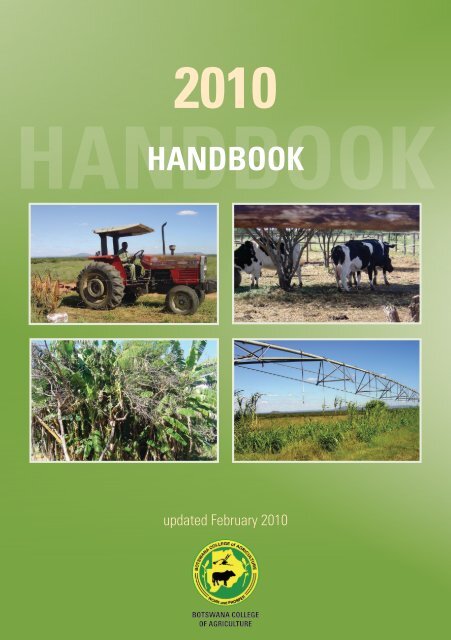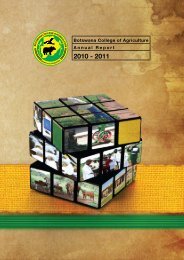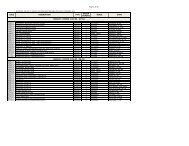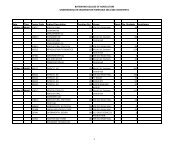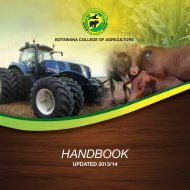HANDBOOK - Botswana College of Agriculture
HANDBOOK - Botswana College of Agriculture
HANDBOOK - Botswana College of Agriculture
Create successful ePaper yourself
Turn your PDF publications into a flip-book with our unique Google optimized e-Paper software.
2010<br />
<strong>HANDBOOK</strong><br />
updated February 2010<br />
BOTSWANA COLLEGE<br />
OF BCA AGRICULTURE<br />
handbook
INTRODUCTION<br />
MISSION<br />
To produce quality graduates<br />
for the agricultural sector<br />
through innovative teaching<br />
and research.<br />
VISION<br />
To be an Agricultural<br />
University <strong>of</strong><br />
international repute<br />
VALUES<br />
Team Work:<br />
Promote cooperation and<br />
collaboration<br />
Innovation:<br />
Embrace creativity<br />
for progress<br />
Integrity:<br />
Maintain high moral standing<br />
Excellence:<br />
We pursue excellence through<br />
productivity, discipline and<br />
quality <strong>of</strong> service.<br />
The <strong>Botswana</strong> <strong>College</strong> <strong>of</strong><br />
<strong>Agriculture</strong> (BCA) was established<br />
on 31 st May 1991 when Act No.9<br />
enacted by Parliament came into<br />
effect, replacing the then <strong>Botswana</strong><br />
Agricultural <strong>College</strong>.<br />
Its objective is to serve the people<br />
<strong>of</strong> <strong>Botswana</strong> through excellence<br />
in teaching, learning and training,<br />
research and development in the<br />
science and practice <strong>of</strong> agriculture.<br />
The aim is to promote agricultural<br />
development and production in<br />
<strong>Botswana</strong> and the southern African<br />
region.<br />
BCA conducts research on its own<br />
or in collaboration with other national<br />
and international organisations in<br />
the field <strong>of</strong> agriculture and related<br />
sciences. It also stimulates and<br />
promotes interest in agriculture and<br />
rural development.<br />
BCA took over all the assets,<br />
including students and staff <strong>of</strong><br />
the former <strong>Botswana</strong> Agricultural<br />
<strong>College</strong>, (BAC). BAC was formerly<br />
established in 1967 at Content<br />
Farm, Sebele, 12 kilometres north<br />
<strong>of</strong> the capital city Gaborone when<br />
the Ministry <strong>of</strong> <strong>Agriculture</strong> ( MoA )<br />
decided to transfer the Certificate<br />
in <strong>Agriculture</strong> Programme which<br />
had been <strong>of</strong>fered since 1959 at<br />
Mahalapye.<br />
2 BCA handbook
BCA is a body corporate and hence<br />
a parastatal under the Ministry<br />
<strong>of</strong> <strong>Agriculture</strong> and an Associate<br />
Institution <strong>of</strong> the University <strong>of</strong><br />
<strong>Botswana</strong> (UB).<br />
As an associate institution <strong>of</strong> UB,<br />
BCA <strong>of</strong>fers UB degree and higher<br />
diploma programmes in Agricultural<br />
Sciences, while it is responsible on<br />
its own for short courses <strong>of</strong>fered<br />
by its Centre for In-service and<br />
Continuing Education. (CICE)<br />
Thus within BCA, and with the<br />
concurrence <strong>of</strong> UB, a Faculty <strong>of</strong><br />
<strong>Agriculture</strong> (FoA) was established<br />
which reports to the University<br />
Senate on all academic matters<br />
pertaining to UB programmes.<br />
STUDENT FACILITIES<br />
The <strong>College</strong> has a wide range <strong>of</strong><br />
facilities for students.<br />
Hostels<br />
The <strong>College</strong> has four hundred and<br />
eighty-six (486) beds on campus.<br />
Most <strong>of</strong> the accommodation is on<br />
sharing basis, but male and female<br />
students have different blocks.<br />
There are two hostel blocks which<br />
collectively can accommodate forty<br />
eight (48) students on a non-sharing<br />
basis, reserved for final year BSc<br />
students. One wing is for female<br />
students while the other is for male<br />
students. There is a third block with<br />
25 single rooms specially reserved<br />
for MSc students. The Dean <strong>of</strong><br />
Student Affairs may allocate a<br />
single room to any other deserving<br />
student on the recommendation <strong>of</strong><br />
a medical practitioner.<br />
Each <strong>of</strong> the blocks has a common<br />
room where students can relax and<br />
watch TV or play one <strong>of</strong> the several<br />
in-door sporting activities. There is<br />
also a laundry with several washing<br />
machines for students under the<br />
care <strong>of</strong> the Student Representative<br />
Council (SRC). Some <strong>of</strong> the blocks<br />
have wardens’ flats attached to<br />
them, which house some hostel<br />
wardens.<br />
Refectory<br />
The <strong>College</strong> has a refectory where<br />
student meals are prepared and<br />
served. The refectory serves three<br />
meals per day. These meals are<br />
served to students resident on<br />
campus. However <strong>of</strong>f campus<br />
students may buy meal coupons for<br />
lunch only.<br />
Health<br />
The <strong>College</strong> has a clinic with two<br />
consultation rooms manned by two<br />
nurses. Cases requiring specialised<br />
medical attention are referred to<br />
BCA handbook 3
the Princess Marina Hospital in<br />
Gaborone. There is always a nurse<br />
on call during the night as well as<br />
weekends and holidays. Wardens<br />
may assist to contact the nurse on<br />
call in case <strong>of</strong> emergencies after<br />
hours.<br />
Recreation<br />
The <strong>College</strong> has a Student<br />
Centre, which houses the<br />
Dean <strong>of</strong> Student Affairs and the<br />
nurses’ <strong>of</strong>fice, Recreation Officer,<br />
Catering Supervisor, the Student<br />
Representative Council, the<br />
gymnasium, student bar and a<br />
multipurpose hall. The hall can be<br />
used for in-door sporting codes such<br />
as basketball, volleyball, badminton<br />
and table tennis.<br />
BCA also has outdoor facilities for<br />
lawn tennis, volleyball, basketball,<br />
soccer, s<strong>of</strong>tball and athletics. Rugby<br />
players use facilities in town while<br />
those interested in karate use<br />
facilities at the <strong>Botswana</strong> Defence<br />
Force Glen Valley barracks. All<br />
sporting and entertainment activities<br />
provided by the <strong>College</strong> are open to<br />
all registered students.<br />
HIV/AIDS PROGRAMME<br />
The <strong>Botswana</strong> <strong>College</strong> <strong>of</strong> <strong>Agriculture</strong><br />
has an HIV/AIDS Coordinator who is<br />
responsible for:<br />
• Developing, coordinating and<br />
implementing the HIV/AIDS<br />
Policy and programmes.<br />
• Coordinating the activities<br />
<strong>of</strong> HIV/AIDS Committee and<br />
departmental activity plans.<br />
• Developing Information,<br />
Education and Communication<br />
(IEC) strategies on HIV/AIDS<br />
in order to prevent and control<br />
the spread <strong>of</strong> HIV/AIDS in the<br />
<strong>College</strong>.<br />
• Providing support and<br />
counselling services to staff<br />
members and students.<br />
The <strong>College</strong> has an active HIV/<br />
AIDS Committee which consists<br />
<strong>of</strong> one representative from each<br />
department and some units (as<br />
determined by their size) and<br />
two students. The Committee is<br />
responsible among other things, for<br />
assisting the HIV/AIDS Coordinator<br />
in all aspects <strong>of</strong> the programme<br />
implementation including organizing<br />
public lectures and running HIV/<br />
AIDS workshops for both staff and<br />
students. There also is an Executive<br />
Committee, which consists <strong>of</strong><br />
BCA Management and heads <strong>of</strong><br />
department and it is chaired by the<br />
Principal. The HIV/AIDS Executive<br />
Committee is responsible among<br />
other things for reviewing and<br />
4 BCA handbook
approving the HIV/AIDS programme<br />
plan and budget. In addition to<br />
the two Committees there is the<br />
Students Against HIV/AIDS (SAHA)<br />
Club. Its main responsibility is to<br />
foster HIV/AIDS awareness and<br />
prevention and to effect attitude<br />
and behaviour change to control<br />
the spread <strong>of</strong> HIV/AIDS among the<br />
student community.<br />
The Tebelopele Voluntary<br />
Counselling and Testing Satellite<br />
Centre was opened at the <strong>College</strong><br />
in 2003 for the Sebele Community.<br />
It opens once a month.<br />
The <strong>College</strong> introduced a General<br />
Education Course on HIV/ADS in<br />
2004, thus raising awareness in the<br />
student community on HIV/AIDS<br />
issues irrespective <strong>of</strong> the field <strong>of</strong><br />
study.<br />
LIBRARY<br />
<strong>Botswana</strong> <strong>College</strong> <strong>of</strong> <strong>Agriculture</strong><br />
Library is an academic agricultural<br />
library which maintains a wide<br />
range <strong>of</strong> materials on agriculture<br />
and related fields. The library is a<br />
depository for publications <strong>of</strong> the<br />
Food and Agricultural Organization<br />
(FAO). The Library is also the<br />
National Centre for the Question<br />
and Answer Service (QAS). The<br />
library has a study area with a sitting<br />
capacity <strong>of</strong> up to 300 patrons at<br />
anytime and a late night study area<br />
for BCA students. The library is fully<br />
computerised and material can be<br />
searched over the internet at http://<br />
host6.bca.bw<br />
The Library Collection<br />
At present the library holdings<br />
stands at 24000 records, consisting<br />
<strong>of</strong> books, bound journals, FAO<br />
materials, audio visual materials,<br />
audio cassettes and compact discs.<br />
Computers<br />
The library has twelve computer<br />
workstations, two dedicated to the<br />
Online Public Access Catalogue<br />
(OPAC) and The Essential Electronic<br />
Agricultural Library (TEEAL) and the<br />
rest for accessing Internet and word<br />
processing. TEEAL is a full text<br />
stand alone database which <strong>of</strong>fers<br />
a collection <strong>of</strong> the most important<br />
agricultural journals in the world.<br />
Online/Electronic Databases<br />
The library subscribes to a number <strong>of</strong><br />
agricultural related online resources<br />
that complement the library’s print<br />
collection. The following online<br />
databases can be accessed from<br />
the library link at: http//host6.bca.<br />
bw<br />
• EBSCO Host<br />
• AGRICOLA<br />
BCA handbook 5
• WebSPIRS<br />
• Bio one E- journals<br />
• FAO magazines<br />
• Encyclopedia Britannica<br />
Membership<br />
Membership to the BCA library is<br />
open to students and staff <strong>of</strong> the<br />
<strong>College</strong>, external users and affiliated<br />
institutions. Library membership<br />
stands at 1060 members.<br />
For more information contact:<br />
The Librarian<br />
Private Bag 0027, Gaborone<br />
<strong>Botswana</strong><br />
Tel: 00267 3650100/3650111<br />
E-mail: lramore@bca.bw<br />
ACADEMIC DEPARTMENTS<br />
BCA is made up <strong>of</strong> six academic<br />
departments and one centre.<br />
The departments are:<br />
1. The Department <strong>of</strong> Agricultural<br />
Economics, Education and<br />
Extension (AEE) – The<br />
department’s mission is to teach<br />
courses in the socio-economic<br />
sciences to students and to<br />
enhance provision <strong>of</strong> human<br />
resources development in the<br />
country. Its major components<br />
are economics, education and<br />
extension.<br />
For more information contact:<br />
Head <strong>of</strong> Department<br />
<strong>Botswana</strong> <strong>College</strong> <strong>of</strong> <strong>Agriculture</strong><br />
Private Bag 0027, Gaborone<br />
<strong>Botswana</strong><br />
Tel: 00267 3650100/3650224<br />
E-mail: mmahabil@bca.bw<br />
2. The Department <strong>of</strong> Agricultural<br />
Engineering and Land Planning<br />
(AEL) - Its main responsibility is<br />
to teach and train students in the<br />
physical technologies to provide<br />
expertise and technical support<br />
to agriculture and allied industries<br />
in <strong>Botswana</strong>. The department<br />
provides the required training in<br />
the four major components <strong>of</strong><br />
agricultural engineering being;<br />
farm power and machinery,<br />
soil and water, postharvest<br />
technology and farm structures<br />
and services.<br />
For more information contact:<br />
Head <strong>of</strong> Department<br />
<strong>Botswana</strong> <strong>College</strong> <strong>of</strong> <strong>Agriculture</strong><br />
Private Bag 0027, Gaborone<br />
<strong>Botswana</strong><br />
Tel: 00267 3650100/3650124<br />
E-mail: cpatrick@bca.bw<br />
6 BCA handbook
3. Department <strong>of</strong> Animal Science<br />
and Production (ASP) - It <strong>of</strong>fers<br />
courses in animal agriculture.<br />
The courses taught are meant<br />
to empower students to serve<br />
animal agriculture in their own<br />
capacity as entrepreneurs<br />
or as public or private sector<br />
employees. The department<br />
has three components; Animal<br />
Health, Animal Nutrition and<br />
Range Science.<br />
For more information contact:<br />
Head <strong>of</strong> Department<br />
<strong>Botswana</strong> <strong>College</strong> <strong>of</strong> <strong>Agriculture</strong><br />
Private Bag 0027, Gaborone<br />
<strong>Botswana</strong><br />
Tel: 00267 3650100/3650155<br />
E-mail: ewaugh@bca.bw<br />
4. Department <strong>of</strong> Basic Sciences<br />
(BS) - It is an interdisciplinary<br />
department that provides facilities<br />
for teaching mathematics,<br />
physics, chemistry, Biometry and<br />
biological sciences. The major<br />
role <strong>of</strong> the department within the<br />
<strong>College</strong> is to teach foundation<br />
courses in the sciences to<br />
students in all programmes.<br />
Tel: 00267 3650100/3650223<br />
E-mail: rmnjogu@bca.bw<br />
5. Department <strong>of</strong> Crop Science and<br />
Production (CSP) - It teaches<br />
and conducts relevant research<br />
in the field <strong>of</strong> crop science and<br />
production. It consists <strong>of</strong> six<br />
main disciplines: agronomy,<br />
crop protection, horticulture,<br />
forestry and range ecology and<br />
soil science.<br />
For more information contact:<br />
Head <strong>of</strong> Department<br />
<strong>Botswana</strong> <strong>College</strong> <strong>of</strong> <strong>Agriculture</strong><br />
Private Bag 0027, Gaborone<br />
<strong>Botswana</strong><br />
Tel: 00267 3650100/3650137<br />
E-mail: smachach@bca.bw<br />
6. Department <strong>of</strong> Food Science<br />
and Technology (FST) - It<br />
teaches and conducts relevant<br />
research in the field <strong>of</strong> Food<br />
Science and Technology.<br />
It consists <strong>of</strong> four main<br />
disciplines: food processing,<br />
food microbiology, food<br />
analyses and food chemistry.<br />
For more information contact:<br />
Head <strong>of</strong> Department<br />
<strong>Botswana</strong> <strong>College</strong> <strong>of</strong> <strong>Agriculture</strong><br />
Private Bag 0027, Gaborone<br />
<strong>Botswana</strong><br />
BCA handbook 7
For more information contact:<br />
Head <strong>of</strong> Department<br />
<strong>Botswana</strong> <strong>College</strong> <strong>of</strong> <strong>Agriculture</strong><br />
Private Bag 0027, Gaborone<br />
<strong>Botswana</strong><br />
Tel: 00267 3650100/3650204<br />
E-mail: jamartei@bca.bw<br />
7. Centre for In-service and<br />
Continuing Education (CICE)<br />
It is the outreach department <strong>of</strong><br />
the <strong>College</strong>. Its responsibilities<br />
are to promote, coordinate<br />
and deliver short courses in<br />
agriculture, rural development<br />
and related fields.<br />
For more information contact:<br />
Director<br />
<strong>Botswana</strong> <strong>College</strong> <strong>of</strong> <strong>Agriculture</strong><br />
Centre for In-Service and Continuing<br />
Education<br />
Private Bag 0027, Gaborone<br />
<strong>Botswana</strong><br />
Tel: 00267 3650100/3650108<br />
E-mail: plebatha@bca.bw<br />
ACADEMIC PROGRAMMES<br />
Higher Diploma Programmes<br />
(Awarded by UB)<br />
Duration: 3 years/6 semesters<br />
Full-time only<br />
• Higher Diploma in<br />
<strong>Agriculture</strong><br />
• Higher Diploma in Animal<br />
Health and Production<br />
• Higher Diploma Forestry<br />
and Range Ecology<br />
Undergraduate Degree Programmes<br />
(Awarded by UB)<br />
Duration: 4 years/8 semesters<br />
Full-time only<br />
• Bachelor <strong>of</strong> Science Degree<br />
in <strong>Agriculture</strong><br />
• Bachelor <strong>of</strong> Science Degree<br />
in Agricultural Education<br />
• Bachelor <strong>of</strong> Science Degree<br />
in Agricultural Economics<br />
• Bachelor <strong>of</strong> Science<br />
Degree in Agricultural<br />
Mechanization<br />
• Bachelor <strong>of</strong> Science Degree<br />
in Animal Science<br />
• Bachelor <strong>of</strong> Science Degree<br />
in Crop Science<br />
• Bachelor <strong>of</strong> Science Degree<br />
in Food Science and<br />
Technology<br />
8 BCA handbook
• Bachelor <strong>of</strong> Science<br />
Degree in Soil and Water<br />
Conservation Engineering<br />
Graduate Degree Programme<br />
(Awarded by UB)<br />
Duration: Full-Time: 2 years<br />
Part time: 3 years<br />
♦ Master <strong>of</strong> Science Degree<br />
in Agricultural Education<br />
♦ Master <strong>of</strong> Science Degree in<br />
Animal Science<br />
♦ Master <strong>of</strong> Science Degree<br />
in Crop Science<br />
♦ Master <strong>of</strong> Science Degree<br />
in Agricultural Engineering.<br />
Entrance Qualifications for Higher<br />
Diploma and Undergraduate<br />
Degree Programmes<br />
a) Admission to Level 100 (First<br />
Year) <strong>of</strong> the Higher Diploma or<br />
BSc degree programmes shall<br />
be on the basis <strong>of</strong> performance<br />
in Science subjects in the<br />
<strong>Botswana</strong> General Certificate <strong>of</strong><br />
Secondary Education (BGCSE)<br />
examination, or its equivalent.<br />
Applicants for Higher Diploma<br />
or BSc programmes shall be<br />
required to:<br />
i) have taken at least six subjects,<br />
including English Language<br />
and Mathematics, at the<br />
♦<br />
♦<br />
ii)<br />
<strong>Botswana</strong> General Certificate <strong>of</strong><br />
Secondary Education (BGCSE)<br />
examination or at one sitting <strong>of</strong><br />
its equivalent and obtained:<br />
a minimum grade <strong>of</strong> Pass (D)<br />
or its equivalent in English<br />
Language<br />
a minimum grade <strong>of</strong> Credit (C)<br />
or its equivalent in Mathematics<br />
In addition to the above basic<br />
requirements, applicants<br />
for Higher Diploma or BSc<br />
programmes must have:<br />
a minimum grade <strong>of</strong> C or its<br />
equivalent, in at least two <strong>of</strong><br />
♦<br />
♦<br />
♦<br />
Physics<br />
Chemistry<br />
Biology<br />
OR<br />
a minimum grade <strong>of</strong> BB, or its<br />
equivalent, in Science Double<br />
Award or its equivalent.<br />
iii) The other qualifying subject(s)<br />
must be a minimum <strong>of</strong> a credit<br />
or its equivalent in at least one<br />
<strong>of</strong> the following:<br />
☛ <strong>Agriculture</strong><br />
☛ Development Studies<br />
☛ Literature in English<br />
☛ Design and Technology<br />
☛ Food and Nutrition<br />
BCA handbook 9
☛ Computer Studies<br />
☛ Business Studies<br />
☛ Any other subject(s) deemed<br />
appropriate by the Faculty <strong>of</strong><br />
<strong>Agriculture</strong><br />
b) An applicant who has taken<br />
relevant Advanced (A) – level<br />
or equivalent examinations<br />
and attained a minimum <strong>of</strong> one<br />
E and two Ds in the relevant<br />
subjects may be admitted to<br />
Higher Diploma or BSc degree<br />
programmes. If an applicant<br />
has grade E or better at<br />
Advanced (A)-level or equivalent<br />
examinations in Science<br />
subjects s(he) may, subject to<br />
the recommendation <strong>of</strong> the<br />
relevant Head <strong>of</strong> Department<br />
and approval <strong>of</strong> the Deputy<br />
Dean, be awarded credits and<br />
exempted from equivalent<br />
course(s) prescribed for Higher<br />
Diploma or BSc programmes.<br />
c) Applicants who have a relevant<br />
Certificate, Diploma or Higher<br />
Diploma in <strong>Agriculture</strong> or<br />
allied fields from an approved<br />
institution or equivalent<br />
qualifications may be admitted<br />
for higher Diploma Programmes<br />
or BSc respectively and be<br />
awarded credits from the<br />
Certificate, Diploma or Higher<br />
Diploma courses.<br />
Entrance Qualifications for Graduate<br />
programmes<br />
1. The normal minimum<br />
entrance requirement shall<br />
be a Bachelor’s degree <strong>of</strong> the<br />
University <strong>of</strong> <strong>Botswana</strong> or any<br />
other recognized University or<br />
equivalent institution with at<br />
least a second class, second<br />
division or equivalent (3.0 GPA,<br />
on a 5-point scale) in the relevant<br />
field.<br />
2. Candidates with a ‘Pass’ or<br />
equivalent, and who have at<br />
least two years <strong>of</strong> relevant work<br />
experience, may be considered<br />
for provisional admission.<br />
After successful completion<br />
<strong>of</strong> 2 semesters <strong>of</strong> full-time<br />
academic work or 24 credits<br />
<strong>of</strong> part-time work, the student<br />
will be considered to be in good<br />
academic standing.<br />
3. Applicants who have completed<br />
a postgraduate diploma are<br />
eligible for admission into a<br />
relevant Master’s programme.<br />
The number <strong>of</strong> credits to be<br />
allowed towards the Master’s<br />
will be assessed on admission.<br />
4. Subject to the approval <strong>of</strong> the<br />
Departmental Board and the<br />
UB School <strong>of</strong> Graduate Studies,<br />
students seeking to transfer<br />
from another recognized<br />
10 BCA handbook
institution may be credited with<br />
up to a maximum <strong>of</strong> one-third<br />
<strong>of</strong> the total number <strong>of</strong> credits<br />
required for the programme.<br />
A transfer student must meet<br />
existing Departmental and<br />
Faculty pre-requisites for the<br />
intended programme <strong>of</strong> study.<br />
A prospective applicant is advised<br />
to discuss his/her proposed<br />
programme with the relevant<br />
department before applying.<br />
Application for Admission:<br />
Undergraduate/Graduate.<br />
Programmes are advertised during<br />
the period March to April each year<br />
for candidates wishing to enrol in<br />
August <strong>of</strong> the same year.<br />
NB: Meeting the minimum entry<br />
requirements does not guarantee<br />
admission. Final selection <strong>of</strong><br />
candidates is based on the best<br />
grades and availability <strong>of</strong> space.<br />
☛ Admitted applicants will be<br />
required to produce /show<br />
letters <strong>of</strong> sponsorship at the<br />
time <strong>of</strong> registration.<br />
☛ Non-Batswana students have to<br />
produce satisfactory evidence<br />
<strong>of</strong> the award <strong>of</strong> sponsorship and<br />
be in possession <strong>of</strong> valid travel<br />
documents to enter the country<br />
and resident permits.<br />
☛ All self-sponsored students are<br />
required to pay all the semester<br />
fees before registration.<br />
CICE Courses (Course certificate<br />
awarded by BCA) Offers short<br />
courses (one to ten days) in<br />
agriculture and rural development<br />
to certificate, diploma and degree<br />
holders in agricultural disciplines<br />
and farmers who have gone<br />
through formal education. At the<br />
end <strong>of</strong> each course participants are<br />
awarded a certificate <strong>of</strong> attendance.<br />
SPONSORSHIP<br />
☛ The <strong>College</strong> (BCA) does not<br />
<strong>of</strong>fer sponsorships or bursaries.<br />
<strong>Botswana</strong> citizens admitted to<br />
undergraduate programmes<br />
are advised to apply to the<br />
Department <strong>of</strong> Tertiary<br />
Education Financing (DTEF) in<br />
the Ministry <strong>of</strong> Education for<br />
sponsorship.<br />
BCA handbook 11
SCHEDULE OF FEES (IN PULA)<br />
2009/2010<br />
The following breakdown shows the current annual rates (2009/2010)<br />
for, Higher Diploma, BSc. and Masters programmes <strong>of</strong>fered at BCA. The<br />
figures may be revised upwards anytime.<br />
STUDENT ADMISSION AND FEES<br />
SCHEDULE OF FEES –2009/10 Fees (in Pula)<br />
FEES<br />
PROGRAMMES<br />
Annual Fee Estimate* Fee For One Credit<br />
Undergraduate Programmes<br />
Resident Students 19 300 643<br />
Non-Resident Students 38 600 1 287<br />
Graduate Programmes<br />
Resident Students 17 050 710<br />
Non-Resident Students 25 575 1 066<br />
OTHER FEES<br />
Application Fee<br />
Resident Students 180<br />
Non-Resident Students 360<br />
Late Application Fee (Applicable to<br />
Masters only)<br />
Resident Students 260<br />
Non-Resident Students 530<br />
Student Life Fee 70<br />
Late Registration Fee/Day (returning<br />
students maximum 10 working days )<br />
Late Registration Fee/Day (new<br />
students maximum 14days<br />
100<br />
60<br />
12 BCA handbook
Protective Clothing<br />
Transcript Fee 25<br />
Identity Card Fee 35<br />
*Based on normal load <strong>of</strong> 30 credits for undergraduates and 24 credits for post-graduate<br />
students<br />
Accommodation Fee<br />
Undergraduate Full-time Student/Annum* 4 000<br />
Refectory Fee Undergraduate Student/Annum* 8 970<br />
Laundry Fee/Annum 430<br />
**subject to change during 2009/2010<br />
NOTE<br />
*Subject to change during 2009/10<br />
CAREER OPPORTUNITIES<br />
The Student Enterprise Project<br />
Training Programme<br />
<strong>Botswana</strong> <strong>College</strong> <strong>of</strong> <strong>Agriculture</strong> has<br />
developed the Student Enterprise<br />
Project (SEP)programme to train for<br />
both the public and private sector<br />
as well as for self employment<br />
as less and less graduates are<br />
employed in the formal sector. The<br />
Student Enterprize Project is aimed<br />
at equipping agricultural graduates<br />
with pratical and entrepreneurial<br />
skills in agriculture.<br />
In the programme graduating<br />
students apply to do projects in<br />
agriculture and the <strong>College</strong> gives<br />
them loans repayable at the end<br />
<strong>of</strong> the project. The students then<br />
carry out the projects in the <strong>College</strong><br />
for about 10 months, under the<br />
supervision <strong>of</strong> expert staff members.<br />
After completion <strong>of</strong> the project, the<br />
student takes the pr<strong>of</strong>it realised to<br />
enable them to have capital to set<br />
up business ventures in agriculture.<br />
SEP is open to graduates from<br />
regular programmes <strong>of</strong>fered at<br />
the <strong>College</strong> (diploma and degree<br />
programmes).<br />
Over the years, students have<br />
undertaken projects in broiler and<br />
ostrich production, horticulture and<br />
most recently feedlotting. Most<br />
projects did well as the students<br />
made pr<strong>of</strong>it and gained the intended<br />
BCA handbook 13
experience as reflected in their end<br />
<strong>of</strong> project reports.<br />
Some <strong>of</strong> the Career Options<br />
• Employment in the public<br />
service in the Ministries <strong>of</strong><br />
<strong>Agriculture</strong>, Local Government,<br />
Education and other government<br />
departments or parastatal which<br />
require expert agricultural<br />
advice.<br />
• Extension Services – advising<br />
farmers on better agricultural<br />
techniques.<br />
• Research – Doing agricultural<br />
research in any one <strong>of</strong> the five<br />
major areas – Crop Science and<br />
Production, Animal Science<br />
and Production, Agricultural<br />
Economics, Agricultural<br />
Engineering and Agronomy.<br />
• Teaching in BCA, secondary<br />
schools or Rural Training<br />
Centres.<br />
• Woking in Public Corporations<br />
such as banks and cooperatives<br />
as Project Officer for their<br />
agricultural projects or in<br />
management <strong>of</strong> their agricultural<br />
enterprises.<br />
• Opportunities also exist in the<br />
private sector such as farm<br />
management and project<br />
evaluation in Agri-businesses.<br />
• Self employment – by taking<br />
advantage <strong>of</strong> the Student<br />
Enterprise Project (SEP) <strong>of</strong>fered<br />
by the <strong>College</strong> (BCA) and other<br />
programmes <strong>of</strong>fered by the<br />
government such as Citizen<br />
Entrepreneurial Development<br />
Agency (CEDA) among others.<br />
BCA CONSULT<br />
Introduction<br />
The <strong>Botswana</strong> <strong>College</strong> <strong>of</strong> <strong>Agriculture</strong><br />
(BCA), an Associate Institution <strong>of</strong> the<br />
University <strong>of</strong> <strong>Botswana</strong>, has been in<br />
existence for over 30 years. During<br />
this period, it has made substantial<br />
contribution to agricultural<br />
development in <strong>Botswana</strong> through<br />
training <strong>of</strong> human resources and<br />
research in various agricultural<br />
disciplines. BCA academic staff<br />
members have varied specialised<br />
knowledge and experience vital<br />
for agricultural and agro-industrial<br />
development in <strong>Botswana</strong> and the<br />
region.<br />
The <strong>College</strong> recently established a<br />
consultancy company called BCA<br />
Consult (Pty) Ltd. with the aim<br />
<strong>of</strong> <strong>of</strong>fering services in the three<br />
themes <strong>of</strong>:<br />
14 BCA handbook
• Commissioned Consultancy<br />
Services<br />
• Contracted Research and<br />
Development<br />
• Pr<strong>of</strong>essional Development<br />
Programmes<br />
The services are designed primarily<br />
to assist government, parastatals,<br />
agricultural institutions and<br />
enterprises, manufacturers, nongovernmental<br />
and international<br />
organizations in <strong>Botswana</strong> and the<br />
SADC region.<br />
Capacity<br />
BCA is made up <strong>of</strong> six academic<br />
departments with highly trained<br />
personnel. The staff is composed<br />
<strong>of</strong> a multi-disciplinary group <strong>of</strong> PhD<br />
and MSc holders with specialists in<br />
nearly all aspects <strong>of</strong> agricultural and<br />
agro-industry.<br />
The staff can call upon the services<br />
<strong>of</strong> advanced analytical laboratories,<br />
stocked BCA/Department <strong>of</strong><br />
Agricultural Research (DAR)<br />
libraries, computer facilities and<br />
crop and livestock farm units.<br />
In addition, being an Associate<br />
Institution <strong>of</strong> the University <strong>of</strong><br />
<strong>Botswana</strong> greatly strengthens<br />
BCA’s ability to participate in large<br />
integrated projects.<br />
BCA is therefore a high calibre<br />
human resource centre with<br />
capacity to <strong>of</strong>fer consultancy and<br />
advisory services for operations<br />
in agricultural and agro-industry<br />
projects ranging from smallscale<br />
local enterprises to national<br />
development programmes.<br />
PHILOSOPHY<br />
Our philosophy is to understand<br />
your business, collect and<br />
analyse information pertaining to<br />
it, assemble relevant facts and<br />
projections, and give expert advice<br />
to enable you to reach the right<br />
decision on your undertaking.<br />
AREAS OF COMPETENCE<br />
Agricultural Economics<br />
• Advise on resource economics<br />
and farm enterprise selection<br />
• Project planning and<br />
implementation<br />
• Farm business feasibility<br />
studies<br />
• Pre-investment studies<br />
BCA handbook 15
• Assessment <strong>of</strong> socio-economic<br />
implications <strong>of</strong> agricultural<br />
development schemes<br />
• Marketing research and<br />
analysis<br />
• Market planning and<br />
management.<br />
Agricultural Education and Extension<br />
• Development <strong>of</strong> target-oriented<br />
training<br />
• Development <strong>of</strong> curriculum and<br />
training material<br />
• Development <strong>of</strong> extension<br />
programmes<br />
• Anthropological and sociological<br />
surveys<br />
• Baseline studies and prefeasibility<br />
studies<br />
• Formulation, monitoring and<br />
evaluation <strong>of</strong> projects.<br />
Agricultural Engineering & Land<br />
Planning<br />
• Farm machinery policy<br />
formulation<br />
• Farm mechanization strategies/<br />
planning<br />
• Management, testing and<br />
evaluating <strong>of</strong> machinery<br />
• Tillage systems support<br />
• Mechanization project planning<br />
and management<br />
• Land use planning<br />
• Land survey<br />
• Surveying and investigations<br />
projects<br />
• Design and building <strong>of</strong><br />
agricultural structures<br />
• Crop processing, packaging and<br />
storage.<br />
Animal Science and Production<br />
• Livestock production projects<br />
planning<br />
• Development <strong>of</strong> dairy<br />
• Poultry, pigs, sheep/goats<br />
production systems<br />
• Herd health<br />
16 BCA handbook
• Beef ranching<br />
• Range and pasture<br />
development<br />
• Forage production and<br />
conservation<br />
• Formulation <strong>of</strong> dairy, poultry<br />
and pig rations<br />
• Feed evaluation<br />
• Laboratory analysis<br />
• Wildlife farming.<br />
Basic Sciences<br />
• Planning and management <strong>of</strong><br />
biological experiments<br />
• Statistical analysis <strong>of</strong> biometrical<br />
information<br />
• Evaluation <strong>of</strong> animal/plant<br />
genetic improvement<br />
• Evaluation <strong>of</strong> biotechnology<br />
• Taxonomical reviews and<br />
analysis<br />
• Epidemiological modelling<br />
• Ethnobotany and plant diversity<br />
documentation<br />
• Nutritional analysis service.<br />
Crop Science and Production<br />
• Assessment <strong>of</strong> dry land farming<br />
and horticulture potential<br />
• Promotion <strong>of</strong> agro-forestry<br />
on farms for fuel and fodder<br />
supplies and for soil and water<br />
conservation and soil fertility<br />
improvement<br />
• Assessment, management and<br />
evaluation <strong>of</strong> integrated pest<br />
management strategies<br />
• Agrochemical evaluation for<br />
insect pests, diseases and<br />
weeds<br />
• Soil survey, mapping and<br />
classification<br />
• Advise on soil fertility and<br />
fertilizer use<br />
• Soil analysis services.<br />
• Plant and animal mapping<br />
BCA handbook 17
For more information contact:<br />
Deputy Dean<br />
Private Bag 0027, Gaborone<br />
<strong>Botswana</strong><br />
Tel: 00267 3650100/3650172<br />
E-mail: mtapela@bca.bw<br />
For more information please visit our<br />
Website at http://www.bca.bw<br />
OR<br />
Public Relations Office<br />
<strong>Botswana</strong> <strong>College</strong> <strong>of</strong> <strong>Agriculture</strong><br />
Private Bag 0027<br />
Gaborone, <strong>Botswana</strong><br />
Phone: (267) – 3650250/3650100<br />
Fax: (267) – 3928753<br />
E-mail: lagang@bca.bw<br />
18 BCA handbook
NOTES<br />
BCA handbook 19
<strong>Botswana</strong> <strong>College</strong> Of <strong>Agriculture</strong><br />
Private Bag 0027<br />
Tel: +267 3650 100<br />
Fax: +267 3928 753<br />
Gaborone<br />
BCA handbook


